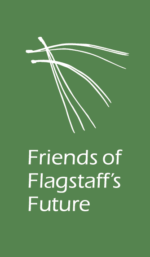Climate Change Adaptation & Resilience

The Colorado Plateau is especially vulnerable to climate change and the challenges it will bring. As conditions become warmer and drier, Flagstaff is at risk for increased wildfires, more frequent flooding, declining forest health, poorer air quality, and a shortfall in water supplies. F3 supports the City of Flagstaff’s plan to achieve carbon neutrality by 2030 (Flagstaff Carbon Neutrality Plan). We believe that climate change must be an orienting principle in all planning and policy decisions that bear on development and land and resource use and that policies and practices must be crafted with the goal of making Flagstaff both more sustainable and more resilient. We believe that resiliency* requires equitable solutions that safeguard the well-being of all our residents and are generational in their impact. Our work includes providing and supporting education on climate change and advocating for policies and strategies that mitigate climate change and prepare the community for changed conditions. Above all, we recognize that the most important thing we can do is strengthen the bonds of community life so we can meet challenging circumstances as a caring, compassionate community.
Resiliency is defined by the Flagstaff Carbon Neutrality Plan as a community’s ability to thrive amidst change. It involves a community’s anticipation of and preparation for changing conditions, whether that is short term stressors like a wildfire or severe weather, or longer-term changes like declines in forest health or shifts in the Flagstaff housing market.
Important Links
Flagstaff Carbon Neutrality Plan
Flagstaff Climate Action and Adaptation Plan
Climate Profile for the City of Flagstaff, Arizona University of Arizona, 2018 (PDF)
Colorado Plateau Greenhouse Gas Emissions Inventory and Forecast Report 2021 (Grand Canyon Trust)
